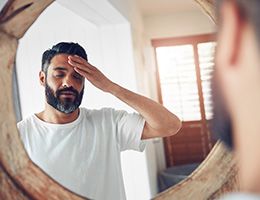Take steps to help prevent headaches

The trick is to pay attention to various factors that can trigger a headache in the first place.
A bad headache can make you lose an entire day. It can send you to bed, with curtains closed and orders for everyone else in the house to be very quiet. All you want is for the pain to go away.
But did you know there are things you can do to help prevent headaches from erupting in the first place?
It's true. The trick is to pay attention to various factors that can trigger a headache, according to the National Headache Foundation.
Following these tips may help you reduce the number and severity of the most common headaches—tension headaches and migraines.
Set a schedule
Maintaining a regular sleep schedule helps keep headaches at bay. Try to wake up and go to sleep at the same times every day, even on weekends.
Watch what and when you eat
Skipping meals is a common headache trigger. Be sure to eat regular meals, including breakfast.
Eating the wrong foods also can lead to problems if you have migraines. Common food triggers for these headaches include cheese, marinated or fermented foods, pickled foods, chocolate, nuts, and excessive amounts of caffeinated beverages like tea, coffee or colas.
Know the risks of alcohol
Ethanol, a chemical commonly found in beer, wine and liquor, contributes to headaches.
Tame stress
Stress is the most commonly recognized trigger of headaches. Events that cause emotional stress can trigger a migraine headache. And stress plays a big role in tension-type headaches too.
You can't completely avoid stress. But you can learn to manage it better, by engaging in relaxation techniques, such as deep breathing.
Keep a record
If you have headaches often, keeping a diary can prove useful. It can help you pinpoint headache triggers so you can avoid them.
Note when headaches occur and other observations. Did you skip a meal? Do certain foods seem to be the culprit? Are you skimping on sleep? Are you stressed out?
Note your symptoms
Do you have tension-type headaches (the most common sort), migraines or cluster headaches? Details about your symptoms can help your doctor suggest the best treatment for you.
Symptoms of tension-type headaches include:
- Pressure or tightness around both sides of the head or neck.
- Mild to moderate pain that is steady and does not throb.
- Pain that's not worsened by activity.
- Pain that can increase or decrease in severity over the course of the headache.
- Tenderness in the muscles of the head, neck or shoulders.
Migraine headaches cause moderate to severe pain that is worsened by light, noise and motion. Some people also experience nausea and vomiting. These types of headaches can last for a few hours or even as long as several days. Women have migraine headaches more often than men. Some women note a change in their headaches around menopause.
Cluster headaches are severe, debilitating headaches that occur repeatedly for weeks to months at a time, followed by periods with no headache. Men are affected more commonly than women, with a peak age of onset at 25 to 50 years old. People who have cluster headaches usually become restless and agitated, and often pace during the headache.
See a doctor
If you have frequent headaches, medical treatment may help. A doctor can prescribe medicines to help prevent and treat headaches, as well as give advice on practicing relaxation techniques and avoiding triggers.
Reviewed 11/9/2023
